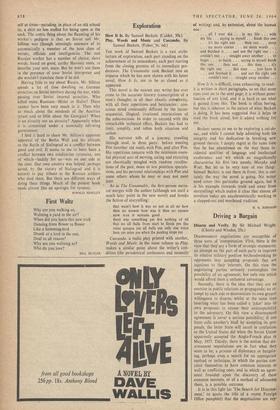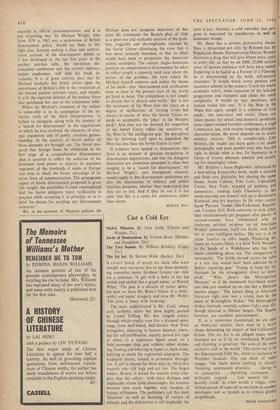Driving a Bargain
Disarm and Verify. By Sir Michael Wright. (Chatto and Windus, 25s.) Disarm and Verify. By Sir Michael Wright. (Chatto and Windus, 25s.)
DISARMAMENT negotiations are susceptible of three sorts of interpretation. First, there is the view that they are a form of strategic manoeuvre; an attempt on the part of each party to improve its relative military position bye-hoodwinking its opponents into accepting proposals that are injurious to their interests. On this view the negotiating parties seriously contemplate the possibility of an agreement, but only one which would afford them a unilateral advantage.
Secondly, there is the idea that they are an ' exercise in public. relations or propaganda; an at- tempt by each side to demonstrate its own greater willingness to disarm, whilst at the same time inserting what has been called a 'joker' into its own proposals to ensure their unacceptability to the adversary. On this view a disarmament agreement is never a serious possibility; if one State calls another's bluff by accepting its pro- posals, the latter State will recoil in confusion, as the United States did when the Soviet Union apparently accepted the Anglo-French plan in May, 1955. Thirdly, there is the notion that dis- armament negotiations are in fact what they seem to be; a process of diplomacy or bargain- ing, perhaps even a search for an appropriate method or technique, in which the parties con- ceive themselves to have common interests as well as conflicting ones, and in which an agree- ment founded upon the discovery of these common interests, or of .a method of advancing them, is a possible outcome.
It is in this light (as 'The Search for Disarma- ment,' to quote the title of a recent Foreign Office pamphlet) that the negotiations are rep- resented in official pronouncements; and it is not surprising that Sir Michael Wright, who from 1959 to 1963 was a spokesman of British disarmament policy, should see them in this light also. Anyone seeking a clear and authori- tative account of the disarmament debate as it has developed in the last few years in the nuclear test-ban talks, the ten-nation dis- armament conference and the current eighteen- nation conference, will find his book in- valuable. It is of great interest, also, that Sir Michael modestly but firmly insists upon the importance of Britain's role in the conclusion of the limited nuclear test-ban treaty, and couples it with the vigorous defence of the nuclear force that purchased her seat at the conference table.
Where Sir Michael's treatment of the subject is vulnerable is in its assumption of the ex- clusive truth of the third interpretation, its failure to recognise, along with the 'element of a 'search for disarmament' in the negotiations in which he was involved, the elements of strat- egic manoeuvre and of public relations games- manship. In the analysis of Soviet policy all three elements are brought out. The Soviet pro- posal that foreign bases be eliminated in the first stage of a comprehensive disarmament plan is asserted to reflect the ambition of the dominant land power to deprive its maritime opponent of the footholds it needs in Europe and Asia to check the Soviet advantage of. in- terior lines of communication. The propaganda aspect of Soviet disarmament proposals is given full weight; the possibility is even contemplated that the Soviet delegates reject verification in practice while accepting it in principle so as to have `an excuse for scuttling any disarmament measures.'
But in his account of Western policies Sir
Michael does not recognise objectives of this kind. He commends the Baruch plan of 1946 as a generous and workable solution of the prob- lem, tragically and shortsightedly rejected by the Soviet Union—dismissing the view that it was never seriously intended, or that its effect would have been to perpetuate the American atomic monopoly. The current Anglo-American position on comprehensive disarmament he takes to reflect simply a sincerely held view about the nature of the problem, the view which Sir Michael himself endorses and makes the theme of his book—that 'disarmament and verification must at least in the present state of the world go hand in hand. The compulsion is pot simply to disarm but to disarm and verify.' But is not the insistence of the West over the years on a degree of verification, of varying levels but always in excess of what the Soviet Union re- gards as acceptable, the 'joker' in the Western pack? And does not the demand for inspection of the Soviet Union reflect the sensitivity of the West to 'the intelligence gap,' the perception that by throwing itself open to inspection the West has less than the Soviet Union to lose?
If evidence were needed to demonstrate that there is an element of genuine bargaining in disarmament negotiations, and that the delegates themselves are sometimes absorbed in what they imagine to be a `search for disarmament,' Sir Michael Wright's own• transparent sincerity would supply it. But disarmament spokesmen are also the instruments of military and public relations purposes, whether they understand that they are or not. And if they do not it is not clear that this is a cause for celebration rather than alarm.
HEDLEY BULL



































 Previous page
Previous page